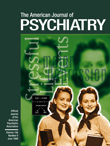Dr. Zanardi and Colleagues Reply
To the Editor: Any discussion about the use of selective serotonin reuptake inhibitors (SSRIs) in the treatment of delusional depression is welcome.
We still think that a new window has been opened in the pharmacotherapy of this disorder for the following reasons: 1) the efficacy of SSRIs in the treatment of delusional depression was recently confirmed by Sacchetti and colleagues (1), with response rates comparable to those obtained in our studies; 2) we recently found that in delusional depression, the addition of the 5-HT1A blocker pindolol can accelerate the response to fluvoxamine, thus supporting the involvement of the serotonergic system in this disorder (2); and 3) there is no evidence of negative findings.
Despite the fact that some authors cite our articles as evidence to argue that SSRIs may be neuroleptics, what we can say with confidence is that SSRIs abate both mood and psychotic symptoms in delusional depression.
The lack of a placebo response in delusional depression is well documented, and it has been proposed that it might be an intrinsic characteristic of such patients (3). In our studies, the absence of a placebo group was a necessity in accordance with the guidelines of our hospital ethics committee because of the severity of illness and the risk of suicide. In all of the cited studies, the response rates to SSRIs were higher than the placebo response expected, even in subjects with nondelusional depression. Also the efficacy of SSRIs combined with antipsychotics in delusional depression has been only tested in open studies (4, 5).
The Structural Clinical Interview for DSM-III-R—Patient Version was used, but not with all patients, because of the peculiar and severe psychopathological condition of some. Anyway, diagnoses strictly followed DSM-III-R criteria and codiagnoses were excluded. The fact that preliminary evidence (as cited by the authors) suggests that patients with other disorders may respond to SSRIs alone does not mean that those with delusional depression should not be expected to respond.
We realize that the Dimensions of Delusional Experience Rating Scale may have some limitations, but a more specific and reliable scale is lacking. Notably, we use this scale in a qualitative manner (presence/absence of delusions), not quantitatively.
Even though we agree that further confirming data are needed, the high disability associated with this disorder and the heavy side effects of traditional treatments make any potentially useful innovation worthy of consideration.
1. Sacchetti E, Conte G, Guarneri L, Calzeroni A, Bertini M, Panariello A: Effectiveness of fluvoxamine and paroxetine in major depressives with psychotic features. Human Psychopharmacology 1997; 12:277–278Crossref, Google Scholar
2. Zanardi R, Franchini L, Gasperini M, Lucca A, Smeraldi E, Perez J: Faster onset of action of fluvoxamine in combination with pindolol in the treatment of delusional depression: a controlled study. J Clin Psychopharmacol, 1998; 18:441–446Crossref, Medline, Google Scholar
3. Glassman AH, Roose SP: Delusional depression: a distinct clinical entity? Arch Gen Psychiatry 1981; 38:424–427Google Scholar
4. Rothschild AJ, Samson JA, Bessette MP, Carter-Campbell JT: Efficacy of the combination of fluoxetine and perphenazine in the treatment of psychotic depression. J Clin Psychiatry 1993; 54:338–342Medline, Google Scholar
5. Wolferssdorf M, Barg T, Konig F, Leibfarth M, Grunewald I: Paroxetine as antidepressant in combined antidepressant-neuroleptic therapy in delusional depression: observation of clinical use. Pharmacopsychiatry 1995; 28:56–60Crossref, Medline, Google Scholar



